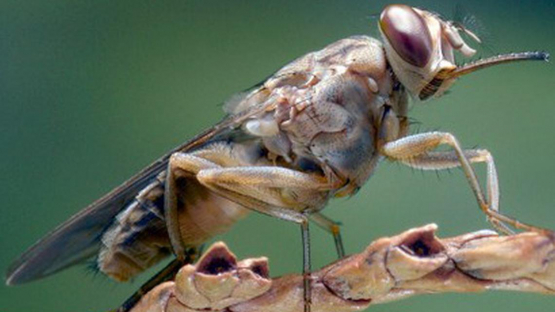IPC highlights

Using Nuclear Technology to Control Pests
The Mediterranean fruit fly – or Medfly for short – is one of the world’s most destructive fruit pests. Video available also in Spanish.

Area-wide Integrated Pest Management
Throughout history, people have had to fight insect pests to reduce diseases, minimize food losses, protect agricultural trade or simply to avoid the nuisance of stinging, biting and buzzing bugs.

Teamwork Award from FAO-AG Department to IPPC-IAEA Joint Team on the Fruit Fly Standards
On 26 January 2017 an award for exceptional teamwork was conferred on the cross-UN agency team consisting of staff from the Joint FAO/International Atomic Energy Agency (IAEA) Division of Nuclear Techniques in Food and Agriculture, and staff from the Standard setting unit of the IPPC Secretariat.

How a Nuclear Technique is Helping the Dominican Republic Win the War Against the Mediterranean Fruit Fly
The Mediterranean fruit fly was reported for the first time in the Dominican Republic in March 2015. It was found in an almond tree off the coast of Punta Cana, the eastern region of the island.

Tackling Fruit Flies with Nuclear Technology in the Dominican Republic
The Mediterranean fruit fly was spotted for the first time in March 2015 in the Dominican Republic.

Using Nuclear Science to Control Mosquitoes
Throughout the millennia, people have fought mosquitoes and the diseases they transmit.

Success Stories on the Use of the Sterile Insect Technique (SIT) and Other Related Nuclear Techniques
The stories present a brief summary of the successful application of SIT for prevention, containment and eradication as well as other applications of nuclear energy such as for enhancing biological control.

Edward Knipling and Raymond Bushland Win Award for the Sterile Insect Technique
Two prominent members of the Entomological Society of America were posthumously selected as winners of the Golden Goose Award, which honors scientists whose federally funded work may have been considered silly, odd, or obscure when first conducted but has resulted in significant benefits to society.

How a Nuclear Technique Helped Save the Orange Industry in Western Cape, South Africa
Citrus is the second most important agricultural export commodity in South Africa, with most of the production destined for exports. The industry employs 10% of the country’s agricultural labour force.

Zika Crisis - The IAEA Responds
The IAEA is providing nuclear-related technology to countries affected by the Zika virus in Latin America and the Caribbean.

Interview with Jorge Hendrichs, Head of the Insect Pest Control Section
It is feasible to eradicate the Mediterranean fruit fly from the Dominican Republic. Available only in Spanish.

Eight Year Study on Tsetse Fly Populations in West Africa Aimed at Optimising Eradication Programmes
The FAO and IAEA have been supporting an 8 year study on the tsetse fly Glossina palpalis gambiensis in West Africa that aimed at developing methodologies to optimise eradication programmes.

Zanzibar Remains Free of Tsetse, 18 Years After Eradication Was Declared
Up until the late 1990s, the island of Unguja, Zanzibar (United Republic of Tanzania) was infested with tsetse - Glossina austeni Newstead. Trypanosomosis prevalence among the mostly indigenous cattle averaged around 19 percent and the rural farming communities were unable to maintain livestock as a basis for productive mixed farming.

IAEA Recognized for Its Contribution to Tsetse and Trypanosomiasis Eradication in Africa
The IAEA has been presented with a certificate recognizing technical support that is provided by the Joint FAO/IAEA Centre of Nuclear Techniques in Food and Agriculture to member countries of the Pan African Tsetse and Trypanosomiasis Eradication Campaign (PATTEC).

Nuclear Techniques Keep Insects at Bay in Croatia’s Neretva Valley
Nuclear Techniques Keep Insects at Bay in Croatia’s Neretva Valley

Using Nuclear Science to Control Pests
For over 50 years, the Sterile Insect Technique (SIT) has been successfully used around the world to tackle pests that destroy fruit and kill livestock.

Controlling Fruit Fly Pest by Releasing Sterile Male Insects
Fruit flies attack many important fruit crops, including citrus, mango, apples, peaches, apricots as well as some vegetables (especially cucurbits), seed crops and many wild plants.

World Malaria Day: How a Nuclear Technique Could Provide a Future Method for Mosquito Control
Malaria represents an important public health issue in Sudan—among hospitals and health clinics in the country’s northernmost regions, malaria is among the most commonly diagnosed and treated diseases.

Preventing Procreation: The IAEA's Research for Mosquito Control
Mosquitoes are one of the world's most dangerous pests. These carriers of diseases such as dengue and malaria wreak havoc over large parts of the world, causing sickness and death. In the future they could be tackled through the use of a nuclear technique.

With IAEA Support, Sudan is Suppressing Mosquito Populations
Malaria represents an important public health issue in Sudan - among hospitals and health clinics in the country's northernmost regions, malaria is among the most commonly diagnosed and treated diseases.
- ‹ previous
- 3 of 4
- next ›

